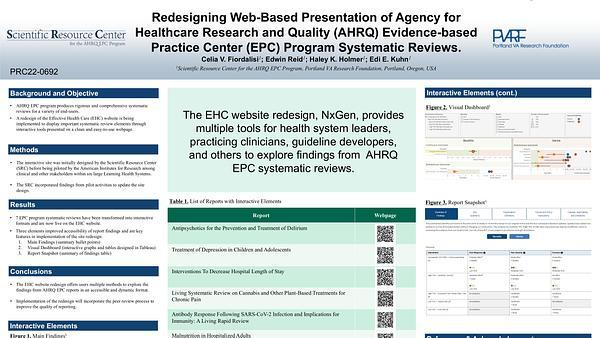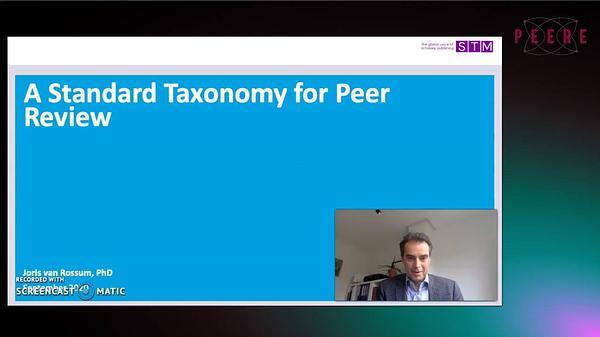Would you like to see your presentation here, made available to a global audience of researchers?
Add your own presentation or have us affordably record your next conference.
keywords:
conflict of interest
funding/sponsorship
Objective Conflicts of interest in systematic reviews (SRs)
have gained recognition,1,2 but overall knowledge is limited,
in particular from a clinical perspective. This study addresses
financial conflict of interest (fCOI) statements in SRs relevant
to primary care.
Design A cross-sectional study of SRs published in 2010 and
2019 that evaluated interventions for 6 common diagnoses
was designed. The diagnoses covered a substantial range of
primary care specialties: chronic obstructive pulmonary
disease, type 2 diabetes, hypertension, dementia, major
depressive disorder, and osteoarthritis. PubMed was searched
by a librarian in June 2021. Two independent researchers
selected relevant SRs; any disagreements were resolved in
consensus. Basic characteristics and data on fCOI and
funding were extracted from full-text versions of SRs. The
SRs of authors disclosing fCOI or reporting funding from the
industry were categorized as “yes.” The SRs of authors
declaring no fCOI and reporting no funding from the industry
were categorized as “no.” Missing information either on
authors ́ disclosure of conflicting interests or information on
funding of the SRs was categorized as “information missing.”
A random sample of 50 SRs per fCOI category (“yes,” “no,” or
“information missing”) was drawn, and data on fCOI and
funding of the primary studies reported in these 150 SRs were
extracted.
Results Of 2234 initially retrieved records, 746 (33%)
relevant SRs were included. Diabetes and pharmacological
interventions were the most common topics: 186 of 746 SRs
(25%) for diabetes and 247 of 746 (33%) SRs for
pharmacological interventions. Most often the first author
was affiliated with an institution in China (130 17%). The
number of relevant SRs increased 4-fold, from 156 in 2010 to
590 in 2019. In 2010, 38 (24%) SRs fulfilled the criteria for
the fCOI “yes” category vs 109 (18%) in 2019 (Table 29). For
osteoarthritis, the pattern was the opposite, with 3 (13%)
categorized as “yes” in 2010 and 28 (23%) in 2019. The
largest proportion of the fCOI “yes” category was noticed for
depression, with 12 (34%) SRs in 2010 and 27 (32%) in 2019.
In 2010, 57 (37%) SRs were categorized as “information
missing” vs 120 (20%) in 2019. The only exception was for
hypertension, with 7 (24%) SRs in 2010 vs 28 (36%) in 2019.
Of the random subsample of 150 SRs, 30 (20%) reported data
on fCOI or funding for the included primary studies.

Conclusions The proportion of SRs disclosing fCOI or
funding from industry was lower in 2019 compared with 2010
but was still missing in every fifth SR, with a direct clinical
association with primary care. Risk factors for these
shortcomings need to be identified, and given this, policies of
journals are notable. Only a few SRs reported data on fCOI
among the included primary studies.
References
1. Hakoum MB, Anouti S, Al-Gibbawi M, et al. Reporting of
financial and non-financial conflicts of interest by authors of
systematic reviews: a methodological survey. BMJ Open.
2016;6:e011997. doi:10.1136/bmjopen-2016-011997
2. Hansen C, Lundh A, Rasmussen K, Hróbjartsson A.
Financial conflicts of interest in systematic reviews:
associations with results, conclusions, and methodological
quality. Cochrane Database Syst Rev. 2019;8(8):MR000047.
doi:10.1002/14651858.MR000047.pub2
Conflict of Interest Disclosures None reported.
Funding/Support The project was supported financially by the
Center for Clinical Research Dalarna, Falun, Sweden.
Role of the Funder/Sponsor The funder did not have any role
in the design and conduct of the study; collection, management,
analysis, and interpretation of the data; preparation, review, or
approval of the abstract; and decision to submit the abstract for
presentation.


